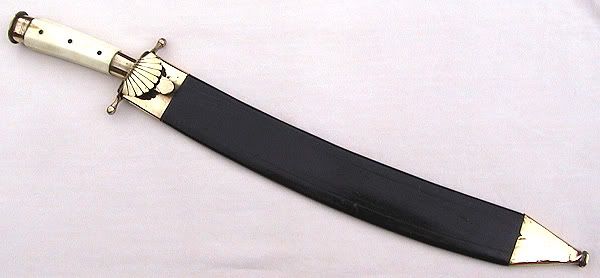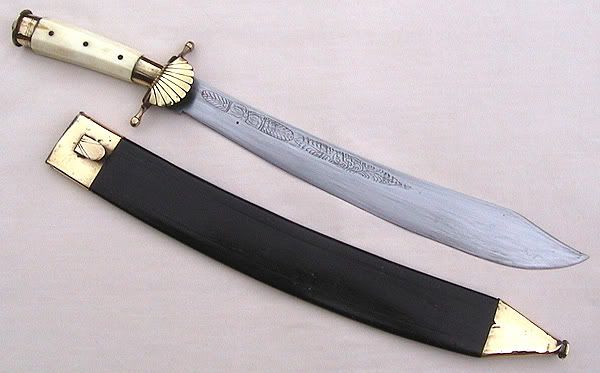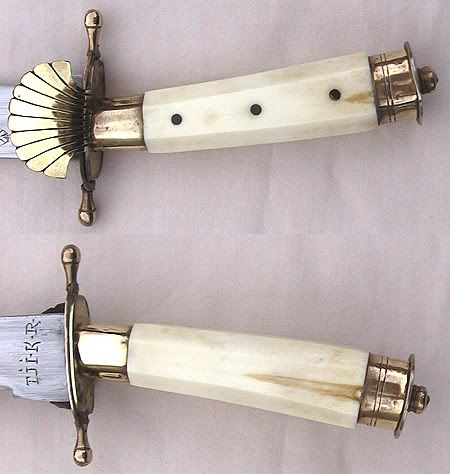
 |
|
|
#1 |
|
Member
Join Date: Apr 2007
Location: Wisconsin, USA
Posts: 413
|
I've become very interested in the edged weapons originating in the hamlets near the Royal Netherlands East Indies Army (KNIL) Headquarters in the Sumedang (Soemedang) Regency of Java, Indonesia in the era of the Aceh wars and slightly thereafter. There are quite a few threads in these forums that touch upon swords from this area and era. I hope in this new thread to pull the information together (with links to sources) for ease of future reference.
As I review the pictures of the swords, it is fascinating to see what can only be called a "collaboration" between the traditional smiths of Java and their European customers as they melded ideas to create what are really a unique group of swords. No two are alike, although they share common elements such as the okir design motif. I also collect Navajo textiles and this "collaboration" in Indonesia is very reminiscent of the time when traditional native American designs (e.g., simple designs found on the "horse blanket") were melded with ideas from the trading posts. The trading posts had to sell the rugs back East, and buyers wanted rugs that had a Persian sensibility: far more complex than traditional Navajo designs. As a result of many years of such collaboration, each trading post originated a unique style of rug that has since been named (after the trading post); some of these styles are still created to this day (e.g., Storm Pattern, Broken Water, Tec Nos Pas, and others) although the art is fading quickly. The name of the hamlets in Java (or initials standing for it) is often engraved on the blade. The hamlets are:
I have collected sample photos from all the threads I could find (plus some from other sources). My plan is to repost those photos here. If you are the copyright holder of any images of swords from these hamlets that have posted in these forums, and object to my intended collation, then please let me know and I will not include the photos. To get us started, here are two of my swords. One is a heavy Tjicatjing Klewang married to a European-style stag horn grip with a clamshell langet on the front of the cross guard. it is beautiful and a delight. The second is a Tjipatjing Golok with a beautiful bone hilt and a European style S-shaped guard. Both blades are very well forged, light in the hand and sharp enough to shave your beard. Best Regards, Dave A |
|
|

|
|
|
#2 |
|
Member
Join Date: Mar 2008
Location: Poole England
Posts: 443
|
Hello Dave,
Bit of a coincidence here. Bought this a month ago and was wondering what it was. Not seen one before. I can't really make out the name and I don't think it matches the names you have listed, but it's a nice piece anyway. it looks like ? JIKR with a date below of 1911 and ? Photos aren't good but feel free to use them if you like. Hilt is horn with brass fittings. Scabbard is wood and brass. Frog is unmarked but presumably nicked from a military weapon. O/a length is 26.5 inches Blade length 20.25 inches Blade thickness is 0.25 inch. Regards Roy |
|
|

|
|
|
#3 | |
|
Keris forum moderator
Join Date: Aug 2006
Location: Nova Scotia
Posts: 7,113
|
Quote:

|
|
|
|

|
|
|
#4 | |
|
Member
Join Date: Apr 2007
Location: Wisconsin, USA
Posts: 413
|
Quote:
|
|
|
|

|
|
|
#5 | |
|
Member
Join Date: Apr 2007
Location: Wisconsin, USA
Posts: 413
|
Roy, thanks for the post.
This is one if the group, definitely. The Okir design is one I have not seen before. How does the sword handle? In my experience these weapons are very well balanced. Dave Quote:
|
|
|
|

|
|
|
#6 |
|
Member
Join Date: Mar 2008
Location: Poole England
Posts: 443
|
Dave
It handles well. Quite heavy for it's length at 786g ( 27 oz ) The blade does not reduce much at all in thickness over it's whole length so it would deliver a substantial blow. Regards Roy |
|
|

|
|
|
#7 |
|
Member
Join Date: Jan 2005
Location: Haifa, Israel
Posts: 183
|
Few more exemplars, all signed TJIKEROEH and dated:
1887   1901 (The name and date are just below the shell cross guard)  1913   1919  
|
|
|

|
|
|
#8 |
|
Vikingsword Staff
Join Date: Dec 2004
Location: The Aussie Bush
Posts: 4,194
|
Hi Dave:
Thanks for starting this page. These are interesting cross-cultural weapons, and the ones I have handled have all been well made. It is interesting to see what some sellers believe they are, and one sometimes sees the darndest attributions for them--European hunting swords, Turkish scimitars, ... I will try to dig out photographs of several I have owned previously. A couple from Tjikeroeh and one from Tjipatjing come to mind, and maybe another one or two. Ian.   
Last edited by Ian; 2nd March 2015 at 06:17 PM. Reason: Added pics |
|
|

|
|
|
#9 |
|
Member
Join Date: Apr 2007
Location: Wisconsin, USA
Posts: 413
|
Thanks all. I'm traveling on business now. I'll add more info later this week.
Dave |
|
|

|
|
|
#10 |
|
Member
Join Date: Apr 2007
Location: Wisconsin, USA
Posts: 413
|
Ideal musing that may become something interesting:
I have found the book by Donn F. Draeger, "The Weapons and Fighting Arts of Indonesia" to be a useful source of information on the great many weapons of the region. While the book focuses primarily on the (to me, dizzying) array of Silat forms, each of those is tied to a region and to preferred weapons. (As is usual, one has to see beyond non-standard transliterations of certain words.) Viz. the topic of this thread, all of the pentjak-Silat forms of West Java are named with the prefix TJI. "Tji" is a Sundanese shorthand for the word "tjai" which means "water from a river". All of the older forms originated (or were perfected) in lowland basin areas of Java The suffix of the name of the Silat form is a word that identifies an animal whose characteristics are thought to match and inspire the distinctive martial mechanics of the form. The sword making hamlets of West Java, identified earlier, also all have names prefixed by "TJI". It would be interesting to discover if there is a linkage between the hamlet name, a particular silat style, and that style's preferred (or unique) weapon. This might be through particular animals or their characteristics. Doing so may shed light on common weapon forms, design and decoration, and influence on other weapons and the martial styles that employed them. Almost all the styles utilize the golok, so that is not much help! Your thoughts and rumination? As always, I acknowledge lack of my own expertise. Information from experts is most welcome. |
|
|

|
|
|
#11 |
|
Vikingsword Staff
Join Date: Nov 2004
Posts: 6,290
|
It seems to me that the preponderance of these examples shown have a fairly strong Western European stylistic influence; many having a sort of Hirschfanger-like appearance to their hilts .
I would be most interested to see stylistic examples that could be attributed to pre-VOC times . I'm a bit skeptical about these weapons being at all a native concept; rather I think one could posit that they were made (and quite well in many cases) solely for the eyes (and purses) of the Dutch .   I am led to understand that the town of Tjikeroeh aka Cikeroeh(sp?) is the modern day location of some of the best (air) gunsmiths in Jawa . |
|
|

|
|
|
#12 |
|
Member
Join Date: Apr 2007
Location: Wisconsin, USA
Posts: 413
|
Rick, I agree with you. These swords were likely custom made for the colonials and their army. What would be interesting is if any of these custom swords inspired designs that were thereafter adopted by the indigenous peoples.
|
|
|

|
 |
|
|